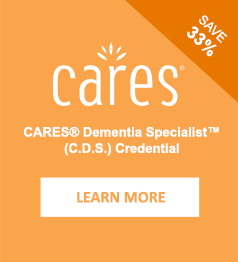Blogs
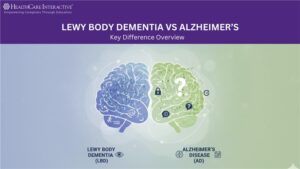
Lewy Body vs. Alzheimer’s: What Every Caregiver Should Know
Every dementia journey is unique. For caregivers, understanding how Lewy Body Dementia (LBD) differs from Alzheimer’s Disease (AD) can make care more effective and compassionate.
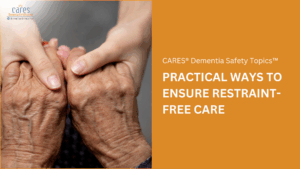
Creating Comfort: How the Right Environment Prevents the Need for Restraints
Minimizing and eliminating restraints in dementia care is not just a policy goal—it’s a compassionate approach that honors the dignity, comfort, and individuality of every
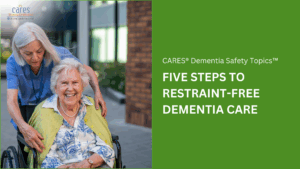
Caring Without Restraints: Connecting Through the CARES® Approach
When caring for individuals living with dementia, minimizing and eliminating restraints is one of the most important steps toward providing compassionate, person-centered care. Restraints—whether physical,
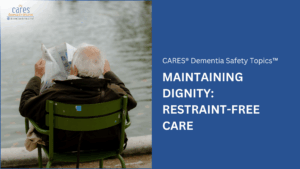
Understanding the Key to Eliminating Restraints in Dementia Care
When a person living with dementia acts out or becomes restless, the first reaction may be to think about safety—sometimes even considering restraints. But before

Rethinking Medication Use in Dementia Care
It’s natural to wonder, “Isn’t there some medication that could help this person?” Specific medications can be helpful for people who truly need them. However,

Hidden Consequences of Restraint Use in People with Dementia
Although restraints are often used in care settings to prevent harm, research and experience show that they frequently cause harm instead. People who attempt to

Why Restraints Hurt More Than They Help
For many years, physical restraints were used in dementia care with the belief that they kept people safe. But behind this idea lies a deeper
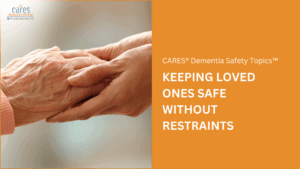
From Safety to Harm: Rethinking the Use of Physical Restraints
In the past, physical restraints were often seen as a necessary part of dementia care. Caregivers and healthcare staff believed that using restraints would help

Restraints in Dementia Care: What They Are and Why They Matter
In dementia care, our primary goal is always to promote safety without compromising dignity or independence. One area that continues to evolve is how we

Safe Steps: Encouraging Positive Wandering in Dementia
When caring for individuals living with dementia, “wandering” is one of the most common behaviors caregivers encounter. But rather than seeing it as a problem

Encouraging Safe Wandering with the 5-Step CARES® Approach
Wandering is a common behavior among people living with dementia. While it can sometimes cause safety concerns, wandering also has positive aspects—it can help individuals
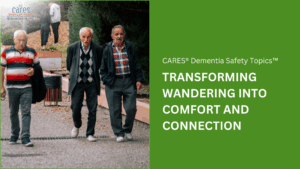
Safe Pathways, Calm Minds: Helping People Wander Well
Wandering is a natural behavior for many people living with dementia. While it can sometimes lead to unsafe situations, it can also be turned into

Wandering at Various Stages of Alzheimer’s Disease
Wandering is one of the most concerning behaviors associated with Alzheimer’s disease and related dementias. It can occur at any stage of the disease, though
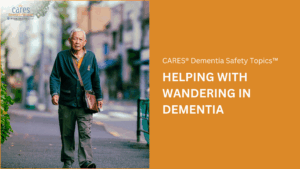
The Many Reasons Behind Wandering in Dementia—and How to Respond
Wandering of people living with dementia is a common behavior, and it often stems from a variety of causes. Understanding these reasons can help caregivers

Beyond the Label: Supporting Safe Movement in Dementia Care
When supporting someone living with dementia, wandering is one of the most common—and often misunderstood—behaviors you may encounter. At first glance, it can feel confusing

From Care to Safety: Preventing Falls in Dementia
Falls are one of the greatest risks faced by people living with dementia, but with the right awareness and strategies, many falls can be prevented.

Minimizing Falls with the CARES® Approach
The risk of falling is one of the greatest concerns for older adults, especially those living with dementia. A fall can lead to serious injury,

Strong Legs, Stronger Lives: Preventing Falls in People with Dementia
Falls remain one of the biggest risks for older adults, particularly those living with dementia. In an attempt to keep loved ones safe, caregivers often

From Clutter to Medications: Hidden Causes of Falls in Seniors
Falls are one of the leading causes of injury among older adults, and when it comes to dementia and fall risks, the chances are even
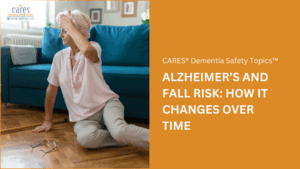
Falling at Various Stages of Alzheimer’s Disease
As Alzheimer’s disease progresses, the risk of falling changes dramatically. While aging alone makes falls more likely, dementia adds unique challenges that evolve with each
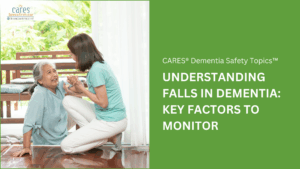
From Observation to Action: Falls Assessments in Dementia Care
Falls are a major concern for people living with dementia. Because changes in memory, perception, mobility, and overall health increase fall risks, it is vital
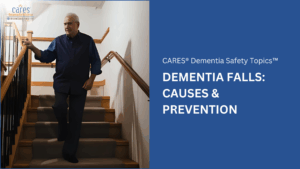
Falls in Dementia: The Role of the Environment and Familiarity
Falls are one of the most common and concerning risks for people living with dementia. While occasional falls may happen to anyone, in dementia care
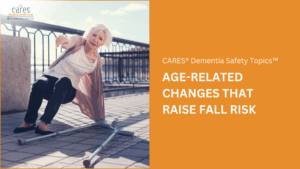
Understanding Age-Related Changes That Increase Fall Risk
Falls are one of the leading causes of injury in older adults—and they’re not just “accidents.” As we age, our bodies go through changes that,
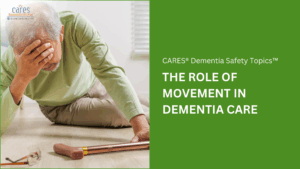
How We Walk: Why Understanding Movement Matters in Dementia Care
We know that something as simple as walking can become a daily challenge for individuals living with dementia. While many of us take walking for
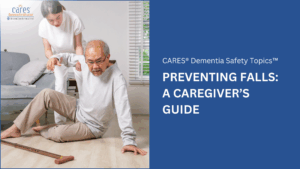
Understanding and Minimizing Falls: A Safety Guide for Caregivers
Falls are among the most common and serious safety concerns in elder care and assisted living settings. Understanding what qualifies as a fall—and how to
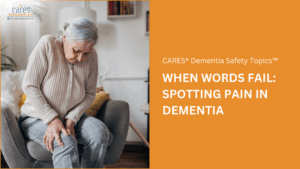
Understanding and Easing Pain in People with Dementia
Pain is a deeply personal experience, and for people living with dementia, it can be especially challenging to communicate. As caregivers, loved ones, or healthcare
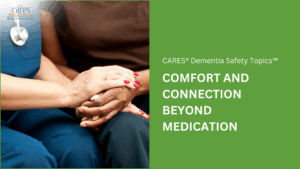
Non-Drug Treatments for Comfort and Connection
In dementia, not all pain relief needs to come from medication; it can also be eased through everyday activities. These approaches are often called non-drug
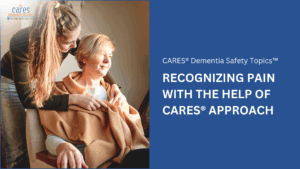
Understanding Pain with the CARES® Approach
The CARES® Approach is a helpful guide for every interaction with someone living with dementia. It helps caregivers understand behaviors, respond to nonverbal cues, and
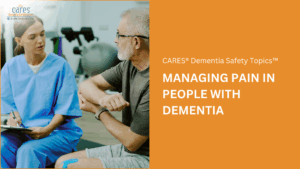
When Dementia Masks Pain: What to Know
When caring for someone with dementia, recognizing pain is not always straightforward. People with dementia may struggle to communicate clearly—especially about discomfort or pain. They

How Does Pain Affect Behavior in People with Dementia?
When caring for someone with dementia, it’s easy to focus on managing behaviors—especially when those behaviors are difficult, confusing, or distressing. But what if the
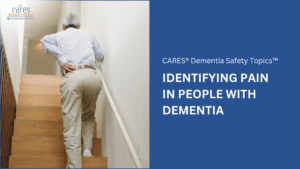
Understanding Untreated Pain in People with Dementia
Pain is a deeply personal and often invisible experience. For individuals with dementia, this invisibility can become even more profound—leading to pain that goes unnoticed,
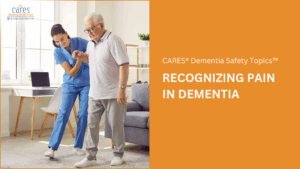
Recognizing Pain in People with Dementia
When someone has dementia, recognizing their discomfort or pain isn’t always straightforward. They may not be able to say, “I’m in pain,” especially as the

Making Mealtimes Meaningful for People with Dementia: Simple Changes, Big Differences
Mealtimes can be a comforting part of the day for people living with dementia—if done thoughtfully. A calm, inviting environment combined with respectful assistance and
